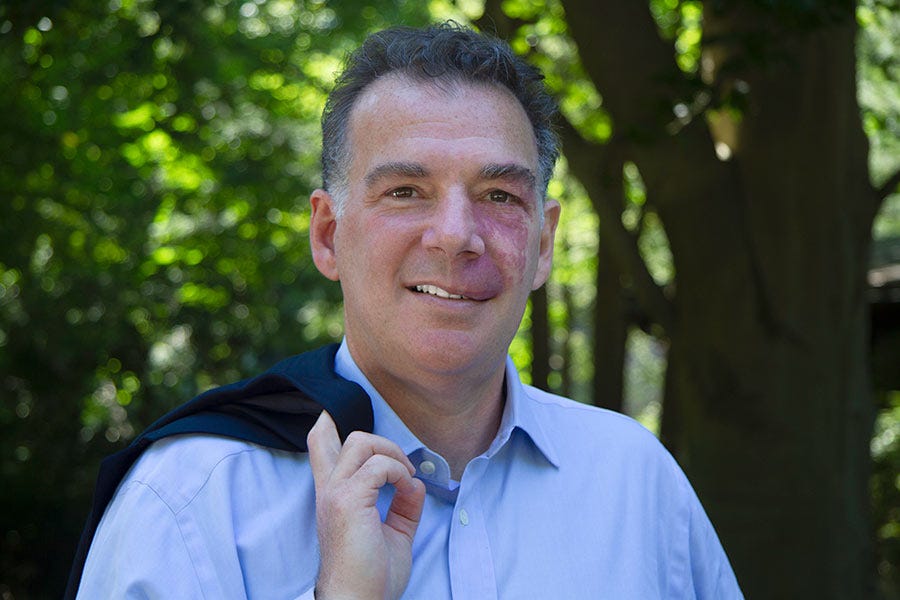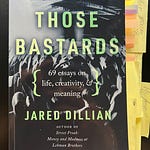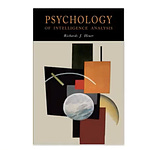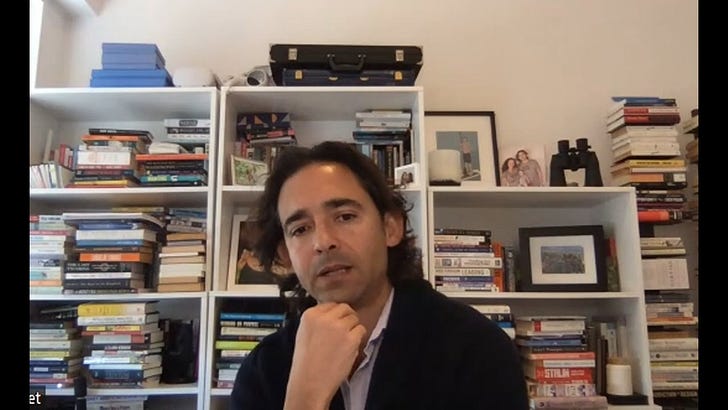You can find the episode on: Spotify, Apple, Google, RSS, and anchor.
“It's all about how you gain control over your mind. It's all an inside job.”
Hello everyone.
I’m very excited to share my conversation with William Green (@williamgreen72), the author of RICHER, WISER, HAPPIER: How the World's Greatest Investors Win in Markets and Life. It’s one of my favorite investment books this year because it is about so much more than just investing. William called it a “stealth spiritual book” and I have big sticker on my copy: “This is not a book about investing.”
This conversation was a about William’s own journey and setbacks, his search for worldly wisdom in everything from Zen Buddhism to Stoicism to the Kabbalah, and the many lessons he learned from great investors. It was the perfect conversation to bookend the year and provided me with a ton of ideas to reflect on over the holidays. I hope you will find it as valuable as I did.
Also, William is working on his own podcast (he mentioned it towards the end of our conversation) for which I’m very excited. Keep an eye out for that, I’m sure he’ll have some amazing guests and deep conversations.
You can find the transcript here. It took a lot of time to clean up the automated transcript and I hope that going forward I’ll be able to pay someone to do that work. However, this also means that the transcript is only going to be available for premium subscribers. You can still find the highlights and timestamps below.
Today's post is sponsored by Tegus. Tegus is an on-demand digital research platform on which investors share their expert calls. Their library currently has some 23,000+ calls covering many public and private companies and it's growing every day. It's a beautiful business model (I wish I was an investor!) and I could see it scaling up to cover any company and industry you can imagine. I think of it as being able to tap into a library of conversations between industry insiders. For example, I recently read Michael Bloomberg's biography and am working on a piece about his origin story. What better way to find more info about the company than to jump through hundreds of expert call transcripts (thanks to their elegant search function)? I'd encourage you to check it out - they offer free trials.
Disclaimer: this podcast is for entertainment purposes only and not investment advice. It does not constitute an offer to sell or the solicitation of an offer to buy any securities mentioned or discussed. Seek your own financial, tax, legal, accounting, or other advisor’s advice before making any investment decisions. Do you own work! I am are not your fiduciary or advisor.
Highlights:
2.00: Introduction, William’s journey to the book.
"This is not an investment book"
3.00: “You can see within investing this exquisite complexity of life, all of the ways in which we're living in this murky place, where we don't know much, and we can't tell what the future holds. And yet we somehow have to try to make decisions.”
“Great investors … they’re tremendous pragmatists. And it struck me. I started to think of them as practical philosophers.”
6.00: “I was working on the last part of the book. Just as COVID was turning our lives upside down. And it gave me an intense sense of my own mortality. And I started to think, well, let me at least leave one thing in my life that's worthwhile. … So there's a sort of grandiosity to the ambition of it where I'm actually trying to create something that will help readers and also at the same time, help myself.”
7.00: William’s study of everything from Zen Buddhism to the Stoics to the Kabbalah. “Tell me about what you're reading and why and how it's influenced your life?”
"I dip into the Zohar almost every day"
“I put in that sentence in the book and nobody has ever asked me about it.”
10.00: “It's really a coded story about how do you get out of the dungeon when you're stuck, when you feel like you're going nowhere in your life, when you're lost, how do you get out of the dungeon? … And so it becomes a story about consciousness and how could he be free? While he was stuck in jail.
11.00: “What they would say is this isn't about a fight that you have every generation with the Amalekites, this tribe that the Israelites fought with 4,000 years ago or whatever it was. It's about this war of consciousness with your own doubt. And so if you read the old Testament, literally, you just think it's kind of this meaningless story about fighting the Amalekites. But if you read it in this sense of it's all really about a path of consciousness.”
12.00: “When I study things like Tibetan Buddhism, which I also find exquisitely beautiful or stoicism, which I found very helpful, I see this tremendous overlap. It's really all about consciousness. It's about how do you gain control of your inner landscape? How do you gain control of your mind? And, and so I think in the epilogue, I quote this great line from the poet Milton, who was blind, who was saying that the mind can make a hell of heaven or heaven of hell.”
14.00: Sir John Templeton. “I failed to understand that what he was saying is no, no, you have to, you have to win this inner game in order to have a happy and successful life.”
17.00: Tsoknyi Rinpoche, handshake practice.
20.00: Jason Karp. “That disconnect between his effort and his performance was torture.”
22.00: “The inner game of writing or investing is dealing with these fears, your anxiety, your desire to be respected, to have honor all of this stuff. It's your ability to deal with setbacks, your sense that however hard you work, sometimes it just doesn't work out.”
24.00: Sometimes life has to burn down?
“We can get subtly misaligned and feel that we're going in the wrong direction, but you keep going. Sometimes you need it all to fall apart in a fairly dramatic way, whether it's a marriage or a job health, a career or reputation, you kinda need it to collapse.”
William’s own setback and dealing with being laid off during the financial crisis.
27.00: “One of the things that I liked about studying Kabbalah actually is that they, as I understood it, they would say if you don't believe that there's water, if you just think it's all random and that stuff just happens and it's unfair and is chaotic, you've actually created that reality because if consciousness is everything you see, the world is just chaos and disorder. But if you think there's order and there's something for you to learn and that everything is there for you to grow, then you create that reality. And it reminds me a bit, there's a beautiful [00:28:00] line from Einstein where he said, you can either live as if everything is a miracle or as if nothing is a miracle.”
“If you look at the things you've gone through, whether it's breakdowns of relationships or breakdowns of career, or existential angst, which I've had tons of over the years and you think, ‘God it all lead to these extraordinary things,’ that's a totally different attitude and different framing than if you say, ‘God things never work out for me.’”
29.00: “There's an extraordinary story where the temple, which was supposed to be the holiest place in the world in Jerusalem, burned down and rabbi Akiva, as he's watching, he starts dancing. And so that's an extraordinary thing.
If you think of that triumph over sadness, uncertainty, fear about what's gonna happen.”
31.00: How did he pick the subjects and ideas of the book?
"One idiosyncrasy of this book is that I’ve focused almost exclusively on investors whom I like and admire." (“I’m particularly drawn to those with wisdom, insights, and virtues that extend beyond an exceptional talent for making money.”)
37.00: Bill Miller
40.00: “And so I saw Bill dealing with this very painful staff in a really honest and honorable way. And he would say well he didn't realize how catastrophically wrong I could be because he said when you've been right, right, right. For all of those years, you said, even though theoretically, you know, that you need to be humble, you actually start to believe that you know what you're talking about.”
43.00: “I write at some point in that epilogue, I say there is as great honor in the simple virtue of perseverance. And I don't say that lightly. I think that really deeply, I mean, there's something, one of the things about writing is that when, when you really simplify and distill things, you're always worried that people will see how banal your mind is and how trivial you are.
But, actually truth is pretty simple, I think. And so for me, when I'm condensing it down to that, I mean, I said there are two great lessons for me from Miller's Miller's downfall and recovery, because his recovery has been equally spectacular. One of them is about the simple virtue of perseverance and [00:44:00] one of them is everyone suffers.”
46.00: “Life as a series of adversities that give you an opportunity either to behave well or badly” (Munger)
48.00: How do I regain sort of control or semblance of control of, of the inner game or if my mind? Is reading enough?
51.00: vice admiral Stockdale,
53.00: “I used to be immensely impressed with the beauty of Miller's mind. When I was first writing about him in my twenties, there was something really wonderful about the fact that he was just so darn smart, just brilliant mind and brilliant moneymaker and gambler who outwitted everyone else.
And gradually as I got older, I realized that actually what I admired most was his extraordinary resilience. And the fact that when faced with this incredible setback, he handled it just incredibly well. And, and there was a moment that I, I don't think I write about in the book where I was in his garden of his home in, in Maryland. … And he was living in a way that was deeply aligned with who he is. And he would show up for work every day and in jeans and a black t-shirt. … And I said to him, it's really amazing, it's kind of like Miller Unbound.
You don't take orders from anyone. You're in control of your time, your [00:55:00] schedule, everything. And he's like, yeah, that's the best. And I, could just see that there was this kind of personal victory of this guy who is now 70, 71 who'd come through this storm and realigned himself afterwards in a way that was deeply true to who he is in all of his glorious idiosyncrasy.”
58.00: “And, and so I'm not super impressed just with the ability to make money and not live a more thoughtful life. I think I was more impressed with that when I was younger. I liked that aspect of the [00:58:00] game of just being able to outwit the crowd. There's something about that, that I found very, very appealing.”
59.00: What is it like to write about people who are very successful financially? Is there a downside (envy)?
“Why their lives resonated with me, whether it was a Bill Miller or a Nick Sleep, or a Monish Pabrai or Charlie Munger, in some ways they were all outsiders who had diverged from the crowd. And they were thinking in a very, in a very free way, they were questioning conventional opinion and they had constructed their lives in a way that was very true to who they are. So that resonated deeply with me because I could see that I was also an outsider who at least in my own mind who didn't naturally want to go with the crowd.”
Ed Thorp, Monish Pabrai, Irving Kahn
1.03.00: The value of freedom and independence.
“I remember at one point working on a project with someone I really disliked who was kind of a bully and threatened me at one point and Monish said to me, you know, if you had had a bit more money, you just would have walked away and said, you know, fuck you. And, and I realized that was true.”
“It's been clarifying to me too, to know that being aligned with who you are in a deep sense is, is a very important thing. That that's the goal. It's the independence. It's not, it's not the number of zeroes in your [01:06:00] account. It's actually living in a way that's true to who you are.”
1.11.00: Self awareness and lessons for non-professional investors. “Stumbling” into the right strategy.
From the book: Nick Sleep: "as luck would have it, he had stumbled into a field that perfectly suited his idiosyncratic mind."
"It also helps if, like Marks and Price, you stumble into an opportunity that happens to suit your talents and temperament."
Eveillard: "He had the good fortune to stumble upon Graham’s value-oriented principles, which gave him an analytical edge."
1.17.00: “Mohnish is optimized, as he once put it to me for the game of investing. He is very rational. He plays the odds. He loves playing, playing blackjack and poker and things like that for money. I mean, he figured out a card counting technique, basically. But he said it's incredibly slow and boring. But that he has the patience for, I can't play games. I find games incredibly tedious, even something like Scrabble, [01:17:00] which I should love as a word person. I'm too impatient for it. And so I have to accept the fact that I'm just not optimized to play the game of sitting in a room reading annual reports and occasionally finding a mispriced gamble, like a Munger does. That just doesn't suit my temperament. And so I have to outsource stock picking to other investors who are better suited for it. And so I think just that self-awareness of saying, am I playing a game, the plays to my strengths, my talents, and my interests.”
1.20.00: Writing a substack vs. a book.
“And I would work 70, 80 hours a week, very consistently. It was a young man's game. It was very intense. And I think I was good at my job, but I don't think [01:22:00] probably ultimately it really suited my talents and, and it may be. Getting laid off, I'm being forced to, to figure out what should I be doing?
Actually set me on a path of writing books. That's much better suited to who I am. And I love writing books. I always adored books. I love the feel of books. And I love podcasts. I love the fact that you can, you can sit and just have a thoughtful conversation. And so those are very idiosyncratic reactions and choices.”
“I write about it very briefly with a guy Mike Zapata who was in seal team six, which is the unit that, that famously killed Osama bin Laden. And he ended up setting up a hedge fund and he said to me yeah, there are three things that are important to me. He said God, family and fund in that, in that order.
And he said, even this conversation that you and I are having it's a little bit outside that. And he said, that's okay. But he said, I just need to know that I need to keep coming back to God, family and fund. I, that was really helpful. And there was something, something kind of wonderfully tactless and lacking in terms of [01:25:00] EQ that he told me that.”
1.29.00: Ed Thorp, Irving Kahn
1.31.00: “And you look at Ed Thorp and he said, when I asked him about what he regretted in his life, he said I don't regret any of the principled decisions that I made. That's a really interesting comment. So then you think, ah, looking back in his 80s, he's really happy about the principled decisions he made, even when they worked against him, even when he made less money.”
If you enjoy my work, please consider sharing it with friends who might be interested. It would mean a lot to me and help me make this my life’s mission. 🙏















Share this post